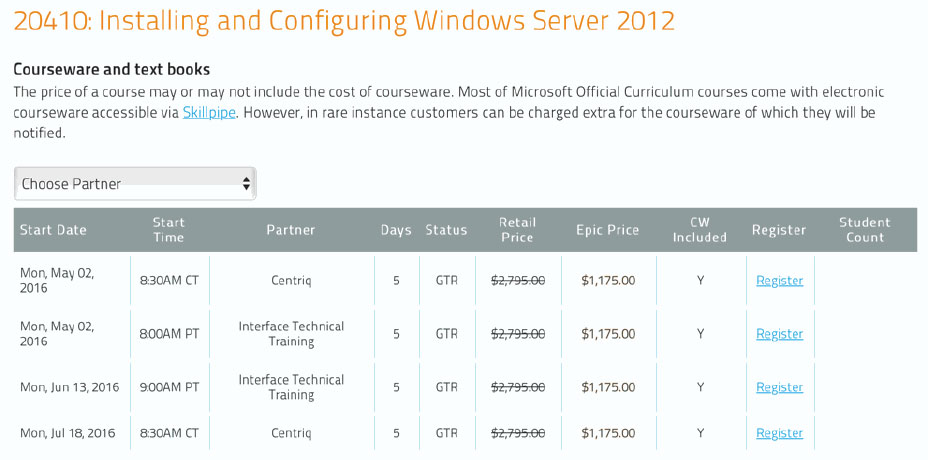TTCP3100: Advanced C++ Programming
About this Course
Advanced C++ Programming (Modern Advanced C++) is a lab-intensive, hands-on C++ training course geared for experienced C++ programmers who wish to take their development skills to the next level. Students will leave this course armed with the required skills to put advanced C++ programming skills right to work in a practical environment, using sound coding techniques and best practices.
This comprehensive course consists of three modules. A preliminary module reviews topics, including inheritance, the ANSI C++ Standard Library, templates. I/O streams, and practical issues of C++ programming, such as reliability & testing. This material is covered as needed depending on the background of the students.
The second module covers more advanced topics. Unit testing, advanced inheritance & polymorphism are discussed. Memory management along with move constructors and RAII are explored. Templates and generic programming are explored including lambda expressions and functors. The third module is a deep dive into the Standard C++ Library. Containers, Algorithms, Threads and much more. Throughout the course, new features of modern C++ (version 11 and beyond) are introduced as well as the impact on programming style. These new features include smart pointers, move constructors, functional programming and lambda expressions.
Audience Profile
This is an intermediate level development course designed for developers with prior C++ programming experience. Students without prior C++ programming background should take the pre-requisite training.
At Course Completion
This “skills-centric” course is about 50% hands-on lab and 50% lecture, designed to train attendees in basic coding with C++, coupling the most current, effective techniques with the soundest industry practices. Working in a hands-on learning environment, guided by our expert team, attendees will explore:
· Modern C++
· Generic Programming
· Memory Management
· Inheritance and Polymorphism
· Exception Handling
· Operator Overloading
· Unit Testing in C++
· Functional Programming
· Runtime Type Information
· STL Containers
· STL Iterators
· Threads & Tasks
Outline
1. Modern C++
· New keywords in C++ 11,14,17
· RAII - Modern memory management in C++ - overview
· Copy vs Move semantics
· Namespaces
2. Generic Programming
· General Purpose Functions
· Function Templates
· Template Parameters
· Template Parameter Conversion
· Function Template Problem
· Generic Programming
· General Purpose Classes
· Class Templates
· Class Template Instantiation
· Non-Type Parameter
· C++ Containers overview
· Variadic Templates
3. Memory Management
· The handle/body (Bridge) pattern
· Using strings effectively
· Smart Pointers
· Move constructor in depth
· Other <memory> features
4. Inheritance and Polymorphism
· Base Class Initializer List
· Composition
· Member Initialization List
· Order of Initialization
· Inheritance vs. Composition
· Interfaces
· Polymorphism
· Chaining Constructors
· Inheriting Constructors
5. Exception Handling
· Exception Handling
· try and catch
· Exception Flow of Control
· Context and Stack Unwinding
· Handling Exceptions in best Context
· Benefits of Exception Handling
· Unhandled Exceptions
· Clean Up
· Multiple Catch Handlers
6. Operator Overloading
· What is overloadable?
· Why overload operators?
· Functors
7. Unit Testing in C++
· Unit testing – Quick Overview
· Unit testing in C++
· Introduction <catch.hpp>
8. Functional Programming
· Overview
· The IoC pattern
· Dependency Injection
· Functions as objects
· IoC via interface
· Functors
· IoC with Functors
· Implementing Functors
· Function Pointers
· IoC with Function Pointers
· Lambda Expressions
· Lambda Syntax
· IoC with Lambdas
9. Runtime Type Information
· Runtime Type and Polymorphism
· type_info Class
· typeid Operator
· Compiler Options
· Safe Pointer Conversions
· Dynamic Cast
· New C++ Style Casts
· Static Cast
· Reinterpret Cast
· Const Cast
10. STL Containers
· Vectors
· Vector.cpp
· Vector Operations
· Typedefs
· Deques
· deque as Stack
· deque Functionality
· Lists
· Generic Programming
· Tradeoff with Lists
· List Memory Allocation
· list Functionality
· Associate Containers
· Sets
· Sets with User Defined Objects
· Multisets (Bags)
· Maps
· Multimaps
· Functional Programming with Containers
11. STL Iterators
· Pointers
· Template Version
· String Version
· A Generalization of Pointers
· STL Iterators
· Input Iterators
· Output Iterators
· Forward Iterators
· Bidirectional Iterators
· Random Access Iterators
12. Threads & Tasks
· Overview Threads
· Starting Threads
· Managing threads
· Overview of Tasks
· Tasks
· async
Prerequisites
Students without prior C++ programming background should take the pre-requisite training.
· TTCP2100: Introduction to C++ Programming

